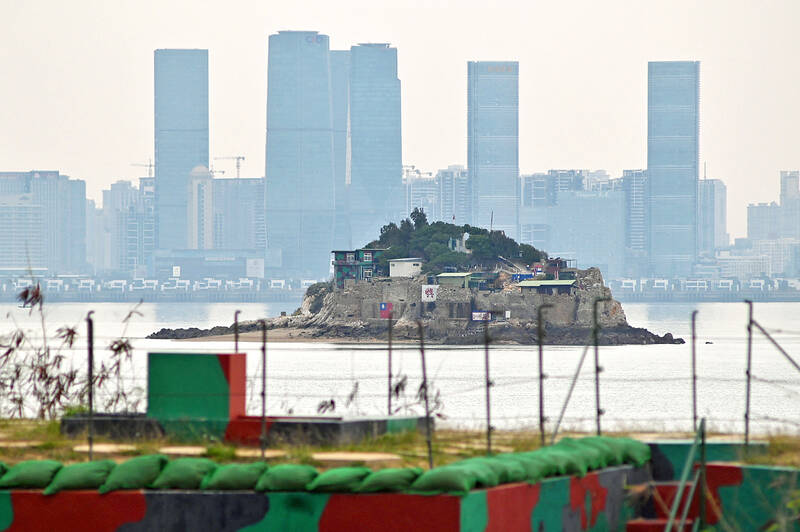Taiwanese who obtain Chinese household residency would have their Republic of China citizenship revoked in accordance with Taiwanese law, an official with knowledge of cross-strait affairs said on Sunday.
Beijing in the past few years has been promoting permanent residency for Taiwanese living in China. To obtain it, an applicant must forfeit their Taiwan compatriot card and Taiwanese identification card, and after a period of time, they can apply for People’s Republic of China (PRC) household residency.
Chinese state media have been promoting the story of Chang Li-chi (張立齊), a professor at Huaqiao University in China’s Fujian Province who was the first to settle in the province under the scheme.

Photo: Sam Yeh, AFP
Chang is a vocal supporter of unification and has traveled often between Taiwan and China, where he earned his doctorate at Beijing University, the Taiwanese official said on condition of anonymity.
In the same vein as Justin Lin (林毅夫), who defected to China in 1979 and later became a vice president at the World Bank, Chang has let himself become a model for Chinese “united front” work, the official said.
However, the permanent residence tactic is unlikely to be effective due to China’s struggling economy and tightening control over national security, they said.
“Foreigners and Chinese alike are fleeing,” they said. “Why would the average Taiwanese want to settle there now?”
According to the guidelines posted by China’s National Immigration Administration, Taiwanese granted permanent residency must forfeit their compatriot card, Taiwanese ID and entry-exit permit to their local public security bureau within six months, the official said.
Then within the period of validity, the resident must apply for household residence and obtain a “residency card,” which is equivalent to naturalization, they said.
Doing so contravenes the Act Governing Relations Between the People of the Taiwan Area and the Mainland Area (臺灣地區與大陸地區人民關係條例), they added.
Article 9-1 of the act states that Taiwanese cannot hold household registration or a passport issued by the PRC.
Those in contravention “shall be deprived” of their citizenship and the rights therein, as well as household registration in Taiwan.
Those who obtain permanent residency, but do not apply for household registration in China before the deadline are viewed as abandoning the process and would not be in contravention of the act, the official said.

The first global hotel Keys Selection by the Michelin Guide includes four hotels in Taiwan, Michelin announced yesterday. All four received the “Michelin One Key,” indicating guests are to experience a “very special stay” at any of the locations as the establishments are “a true gem with personality. Service always goes the extra mile, and the hotel provides much more than others in its price range.” Of the four hotels, three are located in Taipei and one in Taichung. In Taipei, the One Key accolades were awarded to the Capella Taipei, Kimpton Da An Taipei and Mandarin Oriental Taipei. Capella Taipei was described by

EVA Airways today confirmed the death of a flight attendant on Saturday upon their return to Taiwan and said an internal investigation has been launched, as criticism mounted over a social media post accusing the airline of failing to offer sufficient employee protections. According to the post, the flight attendant complained of feeling sick on board a flight, but was unable to take sick leave or access medical care. The crew member allegedly did not receive assistance from the chief purser, who failed to heed their requests for medical attention or call an ambulance once the flight landed, the post said. As sick

Minister of Economic Affairs Kung Ming-hsin (龔明鑫) yesterday said that private-sector refiners are willing to stop buying Russian naphtha should the EU ask them to, after a group of non-governmental organizations, including the Centre for Research on Energy and Clean Air (CREA), criticized the nation’s continued business with the country. While Taiwan joined the US and its Western allies in putting broad sanctions on Russia after it invaded Ukraine in 2022, it did not explicitly ban imports of naphtha, a major hard-currency earner for Russia. While state-owned firms stopped importing Russian oil in 2023, there is no restriction on private companies to

INDUSTRY: Beijing’s latest export measures go beyond targeting the US and would likely affect any country that uses Chinese rare earths or related tech, an academic said Taiwanese industries could face significant disruption from China’s newly tightened export controls on rare earth elements, as much of Taiwan’s supply indirectly depends on Chinese materials processed in Japan, a local expert said yesterday. Kristy Hsu (徐遵慈), director of the Taiwan ASEAN Studies Center at the Chung-Hua Institution for Economic Research, said that China’s latest export measures go far beyond targeting the US and would likely affect any country that uses Chinese rare earths or related technologies. With Japan and Southeast Asian countries among those expected to be hit, Taiwan could feel the impact through its reliance on Japanese-made semi-finished products and